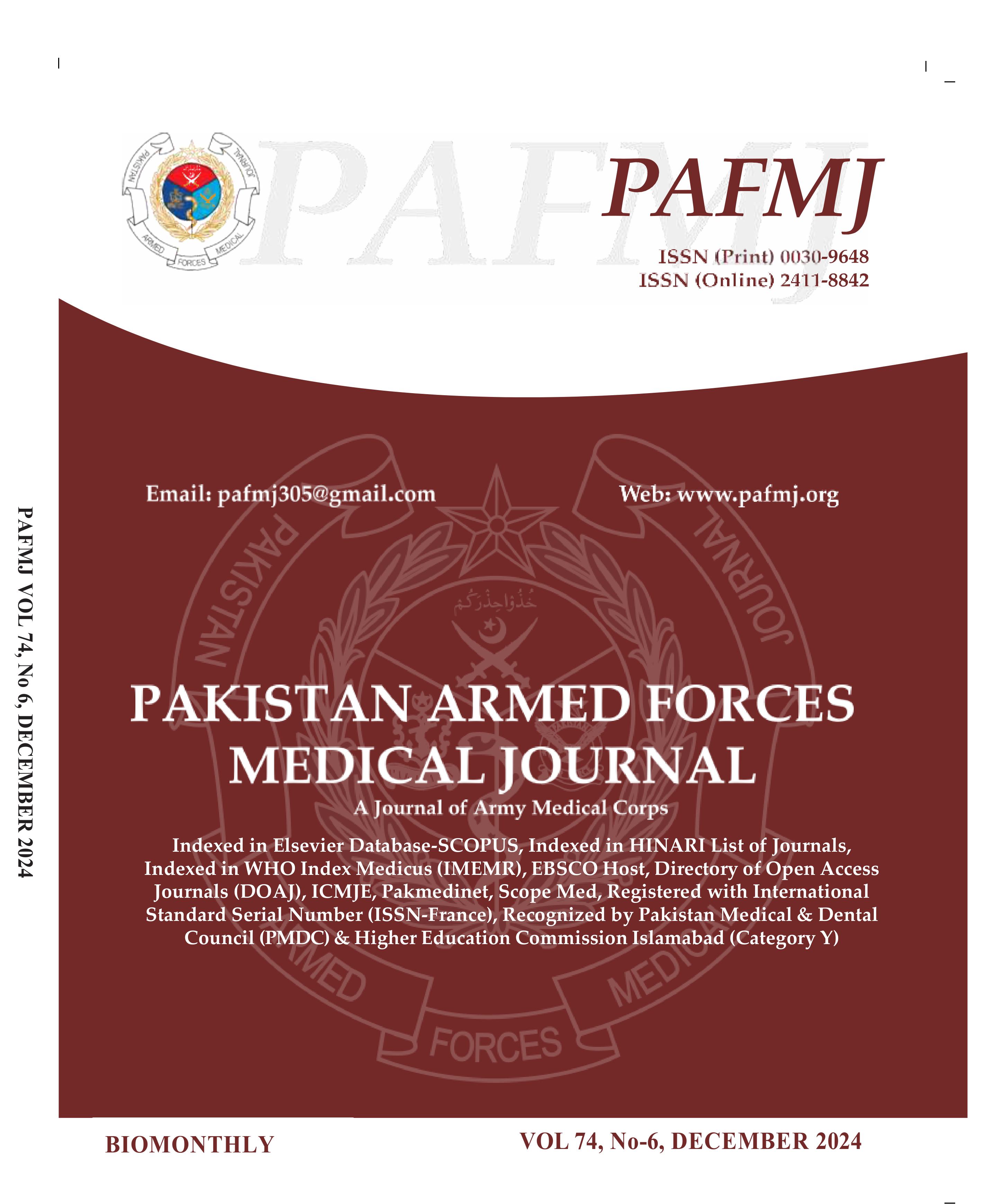Does Participation in Peer Assisted Learning Programs as a Tutor Lead to an Increase in Teaching Skills Domains? A Quasi-Experimental Study
DOI:
https://doi.org/10.51253/pafmj.v74i6.11214Keywords:
Medical Education, Objective Structured Teaching Evaluation, Peer-Assisted Learning, Pakistan, Teaching and Learning.Abstract
Objective: To evaluate the effectiveness of a training program for tutors in peer-assisted learning using objective structured teaching evaluation scores.
Study Design: Quasi-experimental study.
Place and Duration of Study: Combined Military Hospital Lahore Medical College and Institute of Dentistry, Lahore Pakistan, from Jul 2022 to Oct 2022.
Methodology: Peer-assisted learning was introduced for fourth-year MBBS students rotated in the Ear, Nose, and Throat Department. Twenty-two students, demonstrating strong academic performance and a willingness to teach, were chosen as peer-assisted learning tutors. A series of workshops was conducted to equip these tutors with effective peer-assisted teaching and learning strategies. To gauge the influence of the training on the tutors' teaching abilities, data were collected using 12 stationed Objective Structured Teaching Evaluation scores, both pre-and post-workshop series.
Results: Of the 22 students, 16(72.73%) were females, while 6(27.27%) were males. Their ages ranged from 21 - 24 years, with a mean age of 22.45±0.73 years. The study revealed a significant improvement in total Objective Structured Teaching Evaluation raw scores for Peer-assisted learning tutors. The Pre-Objective Structured Teaching Evaluation median score was 35(IQR: 9), exhibiting a substantial increase to 61(IQR: 5.75) Post-Objective Structured Teaching Evaluation, with a statistically significant change (p<0.001).
Conclusion: The research results indicate that training Peer-Assisted Learning Tutors in teaching and learning principles significantly enhanced their teaching skills.
Downloads
References
Marton GE, McCullough B, Ramnanan CJ. A review of teaching skills development programmes for medical students. Med Educ 2015; 49(2): 149-160.
https://doi.org/10.1111/medu.12571
Fakhouri Filho SA, Feijó LP, Augusto KL, Nunes MdPT. Teaching skills for medical residents: are these important? A narrative review of the literature. Sao Paulo Med J 2018; 136: 571-578.
https://doi.org/10.1590/1516-3180.2018.0147060818
Wijnen-Meijer M. Learning to teach in medical education. GMS J Med Educ 2022; 39(1).
https://doi.org/10.3205%2Fzma001535.
Amer MG, Althaqafi RM, Assiri SA, Alsufyani A, Alrubaei FS, Mohamed NM. Aprendizagem assistida por pares: percepção e satisfação dos estudantes de licenciatura em medicina. Millenium 2021; 2(16): 11-22.
Topping KJ. The effectiveness of peer tutoring in further and higher education: A typology and review of the literature. High Educ 1996; 32(3): 321-345.
https://doi.org/10.1007/BF00138870
Makus D, Kashyap A, Labib M, Humphrey-Murto S. A curriculum ignored? The usage of unofficial commercial and peer learning resources in undergraduate medical education at a Canadian medical school. Med Sci Educ 2023: 1-10.
https://doi.org/10.1007/s40670-023-01899-5
Carr SE, Brand G, Wei L, Wright H, Nicol P, Metcalfe H, et al. “Helping someone with a skill sharpens it in your own mind”: a mixed method study exploring health professions students experiences of Peer Assisted Learning (PAL). BMC Med Educ 2016; 16: 10.
https://doi.org/10.1186%2Fs12909-016-0566-8
Khan KW, Imran SS, Ramzan M, Maqsood I. A modern question to answer: a comparative study. J Pak Med Assoc 2021; 71: 1940-1943.
Ehsan AA. Peer-assisted learning (PAL) as an instructional tool in undergraduate dental education. : Ehsan AA. Peer-assisted Learning (PAL) as an Instructional Tool in Undergraduate Dental Education. J Coll Physicians Surg Pak 2020; 30(11): 1184-1187.
https://doi.org/10.29271/jcpsp.2020.11.1184
Haider SI, Riaz Q, Bari MF. Development and Evaluation of a Peer Mentoring Programme for Postgraduate Medical Residents in Pakistan: A Pilot Study. Med Educ 2023; 33(11): 1305-1309.
https://doi.org/10.29271/jcpsp.2023.11.1305
Donohoe CL, Conneely JB, Zilbert N, Hennessy M, Schofield S, Reynolds JV. Docemur docemus: peer-assisted learning improves the knowledge gain of tutors in the highest quartile of achievement but not those in the lowest quartile. J Surg Educ 2015; 72(6): 1139-1144.
https://doi.org/10.1016/j.jsurg.2015.07.001
Utomo PS, Farmawati A, Degnan J, Hidayah RN, Riskiyana R, Rahayu GR. Newly-Graduated Medical Doctors As Near-Peer Tutors For Preparing National Licensing Examination: A Case Report. Jurnal Pendidikan Kedokteran Indonesia 2022; 10(2): 188-195. https://doi.org/10.22146/jpki.62407
Whitmill A, Edwards T, Charles S. Training medical student facilitators of peer-assisted study sessions using an objective standardized teaching exercise. MedEd Portal 2020; 16: 10898.
https://doi.org/10.15766/mep_2374-8265.10898
Herinek D, Woodward-Kron R, Huber M, Helmer SM, Körner M, Ewers M. Interprofessional peer-assisted learning and tutor training practices in health professions education–A snapshot of Germany. Plos One 2022; 17(12): e0278872.
https://doi.org/10.1371/journal.pone.0278872
Burgess A, Dornan T, Clarke AJ, Menezes A, Mellis C. Peer tutoring in a medical school: perceptions of tutors and tutees. BMC Med Educ 2016; 16: 1-7.
https://doi.org/10.1186/s12909-016-0589-1
Rees EL, Quinn PJ, Davies B, Fotheringham V. How does peer teaching compare to faculty teaching? A systematic review and meta-analysis. Med Teacher 2016; 38(8): 829-837.
https://doi.org/10.3109/0142159X.2015.1112888
Guraya SY, Abdalla ME. Determining the effectiveness of peer-assisted learning in medical education: A systematic review and meta-analysis. J Taibah Uni Med Sci 2020; 15(3): 177-184.
https://doi.org/10.1016/j.jtumed.2020.05.002
ten Cate O, van de Vorst I, van den Broek S. Academic achievement of students tutored by near-peers. Int J Med Educ 2012; 3.
https://doi.org/10.5116/ijme.4f0c.9ed2
Manzoor I. Peer assisted versus expert assisted learning: a comparison of effectiveness in terms of academic scores. J Coll Physicians Surg Pak 2014; 24(11): 825-829.
Downloads
Published
Issue
Section
License
Copyright (c) 2024 Ayub Ahmed Khan, Kinza Hussain, Anam Asif, Mustafa Khan

This work is licensed under a Creative Commons Attribution-NonCommercial 4.0 International License.















